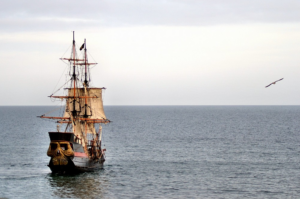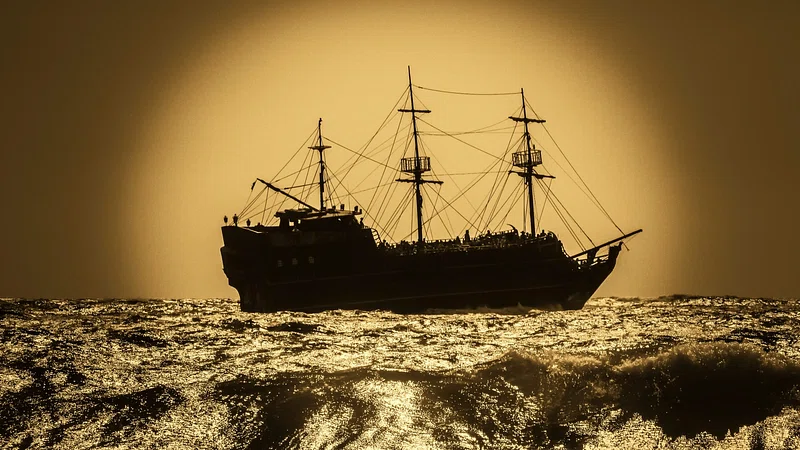In last week’s Rye News Michael Montagu looked at the local pirates who terrorised the local seas in the middle ages – in particular the pirates from Winchelsea who were described as the most savage in Europe. The story continues…
Perhaps the most notorious pirate was Eustace Busket, a Benedictine monk from the abbey of St. Omer close to Calais. He was also skilled in black magic, learned during a visit to Toledo. Back in France, by 1202 he was seneschal and bailiff to Renaud de Dammartin, Count of Boulogne. These were short-lived appointments because in 1204 Eustace was accused of mishandling the count’s estates and fled the district after being declared an outlaw. His own lands were taken and, it is said, that in retaliation he burned two of the count’s windmills. His outlaw status made him an ideal pirate, which he became.
Additionally, he worked as a paid mercenary for both France and England. Between 1205 and 1212 he worked for King John, attacking vessels belonging to King Philip II of France. With 30 ships he and his brothers attacked ports in Normandy, often from his base in Guernsey. In 1205 he captured the Channel island of Sark. True to his nature his loyalty to the English crown faltered and he began to attack English ports. He was again outlawed, this time by King John. He was soon pardoned simply because the king needed him.
In 1212 he changed his allegiance to France bringing Prince Louis of France and his army to England when a civil war began against King John in 1215. Whilst bringing supplies to Prince Louis in August 1217 the King of England’s fleet, commanded by Hubert de Burgh, fought with Eustace. Things were going badly for the English until they loosed powdered lime into the air, which, carried by the wind, caused blindness amongst the French crews. Eustace managed to escape but at the Battle of Sandwich on August 24 1217 he was beaten by a fleet of ships from the Cinque Ports. Caught like a rat in the bilges of his flagship he tried to buy his life, offering fabulous sums of money in exchange for his freedom. Instead, he was beheaded.
It wasn’t always wanton cruelty. In 1327 Benedict Sely and his Winchelsea men attacked a ship belonging to the Hanseatic League, a sort of early Common Market, where mostly Germanic traders worked together to reduce trade barriers, improve communication and fight pirates. This particular ship was well-stocked with good things, including silver and jewellery. Sely and his men were so pleased with their haul that, rather than heave the poor crew over the side, they gave them a boat and allowed them to go free.

The waters of the English Channel were the usual place for Rye and Winchelsea pirates but some looked further afield for their profits. There was a long-standing feud between the Portsmen and the east coast town of Yarmouth. This stemmed from the rights given to the Portsmen when they visited the annual Yarmouth Herring Fair, but they just fought whenever and wherever they met. Two men of Winchelsea were captured and drowned, whilst Portsmen dragged a Yarmouth man out of church in Brittany, held him for a few wretched and miserable days before killing him.
The worst atrocity was in 1297 when King Edward I brought together every ship he could for an attack on Flanders. Portsmen attacked the Yarmouth contingent, burnt 29 ships, emptied their cargos and killed up to 200 men. The total monetary loss was in excess of £3,000. Two surviving ships set out for Winchelsea bent on revenge and killing every man they could find. There weren’t many though, as most were at sea. The Yarmouth men swore an oath to kill every Portsman who came to Yarmouth.
A 1303 Cinque Ports report said that a total of 184 men had been killed in the Yarmouth feud and £13,000 worth of goods stolen. It stated that a Cinque Ports ship had been attacked by Yarmouth men at Hartlepool, with its entire crew, 18 men and two boys, brutally murdered. The feud only ended in the 17th century.
Portsmen even got involved in fights with the Irish. In 1305 men from Winchelsea had a fight in Ross. There were no injuries on either side, but the local mayor said that his townsmen should be friends with the Portsmen ‘so that no ill come to any of the town.’ They refused – a bad mistake! In Brittany, Winchelsea pirates attacked four Ross ships and stripped of a cargo worth £400. The Ross men had to buy their freedom as well.
Image Credits: Raw Pixel https://www.rawpixel.com/image/6071131/free-public-domain-cc0-photo CC https://creativecommons.org/publicdomain/zero/1.0/, Robert Pittman https://www.flickr.com/photos/50144889@N08/9882808764 CC https://creativecommons.org/licenses/by-nd/2.0/.



